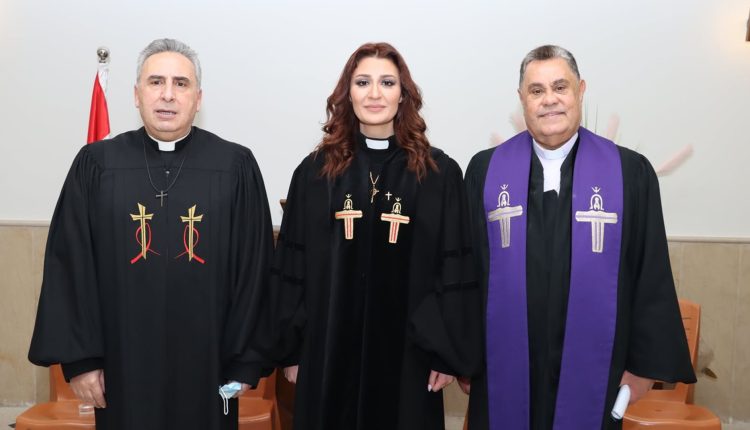Despite Canon law, Matilda Sabbagh becomes the first woman priest in Syria
QAMISHLI, Syria (North Press) – Although the law of the Roman Catholic and Eastern Orthodox Churches forbids women to ascend to temple so women and men don’t get in touch in the holy sanctuary, Ms. Matilda Michael Sabbagh occupies the position of the first priest in Syria, and the third in the history of the Synod.
However, the Protestant (Evangelical) Church does not take this principle, “because it was not mentioned in the Bible, but was put by the disciples of Christ and those who followed,” according to informed sources.
On April 3, 2022, the National Evangelical Synod of Syria and Lebanon announced, during a ceremony presided over by Rev. Joseph Kassab, head of the church in the two countries, that the priest assumed her position in the National Evangelical Presbyterian Church in Hasakah, according to press reports.
The National Evangelical Synod in Syria and Lebanon is the Synod of Christian Bishops, within which clergy are appointed or dismissed, and other religious matters are issued.
The Facebook page of the spiritual and social services of the churches of Hasakah stated that Matilda was the first woman to attain ecclesiastical rank in Syria, and the third in the history of the Synod.
In another post, the page indicated that a number of leaders of Christian denominations and some public and leadership figures in Syria, attended the inauguration ceremony.
Earlier, the first priest in the world of the Evangelical Church in North Lebanon, Rula Suleiman, said that the evangelical sect differs from other Christian sects as it allows the priest’s to get married to build a new Christian family.
As for the elders who get elected from the church’s general assembly, they are not obligated to study theology, but rather they only have to serve the church. Therefore, they have the right to work in another profession and not devote themselves fully to the church, according to Suleiman.
Suleiman also wrote a book issued by the Synod entitled “Serving Women in the Middle East,” in which she highlighted the right of women to priestly ordination.
She stated in her book that “a woman can contribute to exposing and highlighting the male bias in the Bible.”
In another place, she pointed out that “women are generally slower in anger and less emotional, and this helps them not to make quick decisions and enter into disputes that harm life and the peace of the Church.”
The issue of the ordination of women priests raises controversy between supporters and opponents, not only in Syria and Lebanon, but also in Egypt, as the High Commission of the Evangelical Church suspended this decision for the next six years, to be reviewed in 2027.

